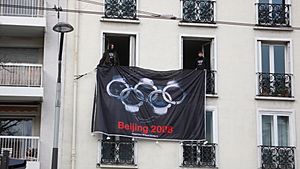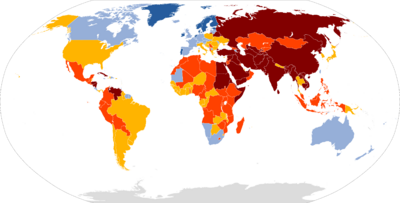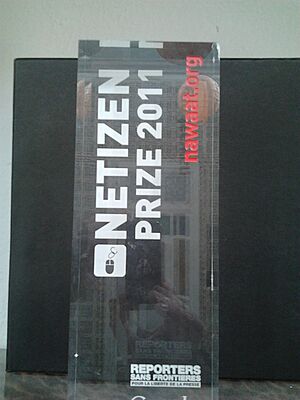Reporters Without Borders facts for kids
|
Reporters Sans Frontières
|
|
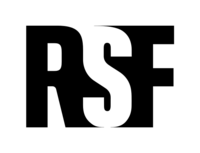
Logo since 2020
|
|
| Formation | 1985 |
|---|---|
| Founder | Robert Ménard, Rémy Loury, Jacques Molénat and Émilien Jubineau |
| Type | Nonprofit organisation, non-governmental organisation with consultant status at the United Nations |
| Headquarters | Paris, France |
|
Director General
|
Christophe Deloire (since July 2012) |
|
Key people
|
Christophe Deloire, Secretary General Pierre Haski, President RSF France Mickael Rediske, President RSF Germany Christian Mihr, CEO RSF Germany Rubina Möhring, President RSF Austria Alfonso Armada, President RSF Spain Gérard Tschopp, President RSF Switzerland Erik Halkjær, President, RSF Sweden Jarmo Mäkelä, President, RSF Finland |
|
Budget
|
€6 million (RSF France) |
|
Staff
|
Approximately 100 |
Reporters Without Borders (RWB; French: Reporters sans frontières; RSF) is an international non-profit and non-governmental organization focused on safeguarding the right to freedom of information. It describes its advocacy as founded on the belief that everyone requires access to the news and information, in line with Article 19 of the Universal Declaration of Human Rights that recognises the right to receive and share information regardless of frontiers, along with other international rights charters. RSF has consultative status at the United Nations, UNESCO, the Council of Europe, and the International Organisation of the Francophonie.
Contents
Activities
RSF works on the ground in defence of individual journalists at risk and at the highest levels of government and international forums to defend the right to freedom of expression and information. It provides daily briefings and press releases on threats to media freedom in French, English, Spanish, Portuguese, Arabic, Persian and Chinese and publishes an annual press freedom round up, the World Press Freedom Index, that measures the state of media freedom in 180 countries. The organisation provides assistance to journalists at risk and training in digital and physical security, as well as campaigning to raise public awareness of abuse against journalists and to secure their safety and liberty. RSF lobbies governments and international bodies to adopt standards and legislation in support of media freedom and takes legal action in defence of journalists under threat. In addition, RSF keeps a yearly count of journalists killed on the job.
To mark World Day Against Cyber-Censorship on 12 March 2020, Reporters Without Borders (RSF) unveiled a list of 20 Digital Predators of Press Freedom and announced that it is unblocking access to a total 21 websites in the sixth year of its Operation Collateral Freedom.
History
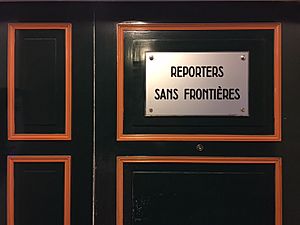
RSF was founded in Montpellier, France, in 1985 by Robert Ménard, Rémy Loury, Jacques Molénat and Émilien Jubineau. It was registered as a non-profit organisation in 1995. Ménard was RSF's first secretary general, succeeded by Jean-Francois Juillard. Christophe Deloire was appointed secretary-general in 2012.
Structure
RSF's head office is based in Paris. It has 13 regional and national offices, including Brussels, London, Washington, Berlin, Rio de Janeiro, Taipei and Dakar, and a network of 146 correspondents. It employs 57 salaried staff in Paris and internationally. A board of governors, elected from RSF's members, approves the organisation's policies. An International Council has oversight of the organisation's activities and approves the accounts and budget.
Advocacy
World Press Freedom Index
Information and Democracy Initiative
In 2018, RSF launched the Information and Democracy Commission to introduce new guarantees for freedom of opinion and expression in the global space of information and communication. In a joint mission statement, the commission's presidents, RSF secretary-general Christophe Deloire and Nobel laureate Shirin Ebadi identified a range of factors currently threatening that freedom. This includes: political control of the media, subjugation of news and information to private interests, the growing influence of corporate actors, online mass disinformation and the erosion of quality journalism.
This Commission published the International Declaration on Information and Democracy to state principles, define objectives and propose forms of governance for the global online space for information and communication. The Declaration emphasised that corporate entities with a structural function in the global space have duties, especially as regards political and ideological neutrality, pluralism and accountability. It called for recognition of the right to information that is diverse, independent and reliable in order to form opinions freely and participate fully in the democratic debate.
At the Paris Peace Forum in 2018, 12 countries launched a political process aimed at providing democratic guarantees for news and information and freedom of opinion, based on the principles set out in the Declaration.
Journalism Trust Initiative
RSF launched the Journalism Trust Initiative (JTI) in 2018 with its partners the European Broadcasting Union (EBU), Agence France Presse (AFP) and the Global Editors Network (GEN). JTI defines indicators for trustworthy journalism and rewards compliance, bringing tangible benefits for all media outlets and supporting them in creating a healthy space for information. JTI distinguishes itself from similar initiatives by focusing on the process of journalism rather than content alone. Media outlets will be expected to comply with standards that include transparency of ownership, sources of revenue and proof of a range of professional safeguards.
Actions
RSF's defence of journalistic freedom includes international missions, the publication of country reports, training of journalists and public protests.
In this function RSF publishes the Munich Charter, an authoritative document which clarifies the "Rights and Obligations" of Journalists. The Munich Charter (fr. Charte de Munich) was developed by the German Journalist Association (de. Deutscher Journalisten-Verband), published in Munich 1971, and is accepted as authoritative within the profession. It was later adopted by most journalists' unions in Europe.
Recent global advocacy and practical interventions have included: opening a centre for women journalists in Afghanistan in 2017, a creative protest with street-artist C215 in Strasbourg for Turkish journalists in detention, turning off the Eiffel Tower lights in tribute to murdered Saudi journalist Jamal Kashoggi and providing training to journalists and bloggers in Syria. In July 2018, RSF sent a mission to Saudi Arabia to call for the release of 30 journalists. The organisation publishes a gallery of Predators of Press Freedom, highlighting the most egregious international violators of press freedom. It also maintains an online Press Freedom Barometer, monitoring the number of journalists, media workers and citizen journalists killed or imprisoned. Its programme Operation Collateral Freedom, launched in 2014, provides alternative access to censored websites by creating mirror sites: 22 sites have been unblocked in 12 countries, including Iran, China, Saudi Arabia and Vietnam. RSF offers grants to journalists at risk and supports media workers in need of refuge and protection.
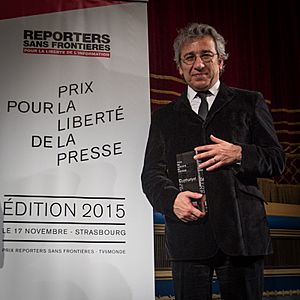
Prizes
RSF's annual Press Freedom Prize, created in 1992, honours courageous and independent journalists who have faced threats or imprisonment for their work and who have challenged the abuse of power. TV5-Monde is a partner in the prize.
A Netizen Prize was introduced in 2010, in partnership with Google, recognising individuals, including bloggers and cyber-dissidents, who have advanced freedom of information online through investigative reporting or other initiatives.
In 2018, RSF launched new categories for the Press Freedom Prize: courage, independence and impact.
Every few years, RSF also distributes Press freedom predator anti-awards.
Press Freedom Prizewinners, 1992–2020
- 1992 Zlatko Dizdarevic, Bosnia-Herzegovina
- 1993 Wang Juntao, China
- 1994 André Sibomana, Rwanda
- 1995 Christina Anyanwu, Nigeria
- 1996 Isik Yurtçu, Turkey
- 1997 Raúl Rivero, Cuba
- 1998 Nizar Nayyouf, Syria
- 1999 San San Nweh, Burma
- 2000 Carmen Gurruchaga, Spain
- 2001 Reza Alijani, Iran
- 2002 Grigory Pasko, Russia
- 2003 Ali Lmrabet, Morocco; The Daily News, Zimbabwe; Michèle Montas, Haiti
- 2004 Hafnaoui Ghoul, Algeria; Zeta, Mexico; Liu Xiaobo, China
- 2005 Zhao Yan, China; Tolo TV, Afghanistan; National Union of Somalian Journalists, Somalia; Massoud Hamid, Syria
- 2006 Win Tin, Burma; Novaya Gazeta, Russia; Guillermo Fariñas Hernández, Cuba
- 2007 Seyoum Tsehaye, Eritrea; Democratic Voice of Burma, Burma; Kareem Amer, Egypt; Hu Jia, Zeng Jinyan, China
- 2008 Ricardo Gonzales Alfonso, Cuba; Radio Free NK, North Korea; Zarganar and Nay Phone Latt, Burma
- 2009 Amira Hass, Israel; Dosh, Chechnya
- 2010 Abdolreza Tajik, Iran; Radio Shabelle, Somalia
- 2011 Ali Ferzat, Syria; Weekly Eleven News, Burma
- 2012 Mazen Darwish, Syria; 8Sobh, Afghanistan
- 2013 Muhammad Bekjanov, Uzbekistan; Uthayan, Sri Lanka
- 2014 Sanjuana Martínez, Mexico; FrontPage Africa, Liberia; Raif Badawi, Saudi Arabia
- 2015 Zeina Erhaim, Syria; Zone9, Ethiopia; Cumhuriyet, Turkey
- 2016 Hadi Abdullah, Syria; 64Tianwang, China; Lu Yuyu and Li Tingyu, China
- 2017 Tomasz Piątek, Poland; Medyascope, Turkey; Soheil Arabi, Iran
- 2018 Swati Chaturvedi, India; Matthew Caruana Galizia, Malta; Inday Espina-Varona; Philippines; Carole Cadwalladr, United Kingdom
- 2019 Eman al Nafjan, Saudi Arabia; Pham Doan Trang, Vietnam; Caroline Muscat, Malta
- 2020 Lina Attalah, Egypt; Elena Milashina, Belarus; Jimmy Lai, Hong Kong
- 2021 Zhang Zhan, China; Pegasus Project of the network Forbidden Stories, France; Majdoleen Hassona, Palestine
Netizen Prize
- 2010 Change for Equality website, www.we-change.org, women's rights activists, Iran
- 2011: Nawaat.org, bloggers, Tunisia
- 2012: Local Coordination Committees of Syria, media centre, citizen journalists and activists, Syria
- 2013: Huynh Ngoc Chenh, blogger, Vietnam
- 2014: Raif Badawi, blogger, Saudi Arabia
- 2015: Zone9, blogger collective, Ethiopia
- 2016: Lu Yuyu and Li Tingyu, citizen journalists, China
Annual reports
RSF issues a report annually.
RSF reported that 67 journalists were killed, while 879 were arrested and 38 were abducted in 2012. The number of journalists killed worldwide in 2014 was 66, two-thirds of whom were killed in war zones. The deadliest areas for the journalists in 2014 were Syria, Palestine, Ukraine, Iraq and Libya (needs citations). The number of journalists convicted by their government rose to 178 in 2014, most of them in Egypt, Ukraine, China, Eritrea and Iran. RSF said that 110 journalists were killed in the course of their work in 2015. In 2016, RSF stated that, there were 348 imprisoned journalists and 52 hostages. Nearly two-thirds of imprisoned journalists were in Turkey, China, Syria, Egypt and Iran. The RSF's 2017 annual report stated that 65 journalists were killed, 326 journalists were imprisoned and 54 journalists were taken hostage during the year. RSF's 2018 report stated that over 80 journalists were killed, 348 were currently imprisoned, and another 60 were being held hostage.
Funding
RSF's budget for 2022 totalled €8m. 52% of the organisation's income comes from the state sector; 22% from foundations; 12% from commercial activities; 11% from sponsorships and public donations. Foundations supporting RSF's work through services include the American Express, the Société Générale, the Swedish International Development Cooperation Agency, and Ford Foundation.
In 2005 RSF was reported by The Guardian to have been criticised by left-wing writer Diana Barahona for accepting funding from the National Endowment for Democracy in the US and the Center for a Free Cuba. She accused RSF of being part of “a neocon crusade” against Fidel Castro's Government of Cuba. In response, Secretary-general Robert Ménard stated that funding from NED totalled 0.92 per cent of RSF's budget and was used to support African journalists and their families. RSF ceased its relationship with the Center for a Free Cuba in 2008.
Recognitions
RSF has received multiple international awards honouring its achievements:
- 1992: received the "Lorenzo Natali Prize" from the European Commission for defending human rights and democracy.
- 1997: received the "Journalism and Democracy Prize" from the Parliament Assembly of the Organization for Security and Co-operation in Europe (OSCE).
- 2005: shared the European Parliament's Sakharov Prize for "Freedom of Thought" with Nigerian human rights lawyer Hauwa Ibrahim and Cuba's Ladies in White movement.
- 2006: received the "Asia Democracy and Human Rights Award" from Taiwan Foundation for Democracy.
- 2007: received the "Dawit Isaak Prize" from the Swedish Publicists' Association.
- 2008: received the "Kahlil Gibran Award for Institutional Excellence" from the Arab American Institute Foundation.
- 2009: shared the "Roland Berger Human Dignity Award" with Iranian human rights lawyer and Nobel peace laureate Shirin Ebadi.
- 2009: received the "Médaille Charlemagne" for European Media.
- 2012: received the "Club Internacional de Prensa" Award, in Madrid.
- 2013: received the "Freedom of Speech Award" from the International Association of Press Clubs, in Warsaw.
- 2014: City of Bonn's 2014 DemokratiePreis.
- 2019: Dan David Prize, Defending Democracy, jointly with Michael Ignatieff.
RSF was criticised for accepting the Dan David Prize, awarded by the Dan David Foundation in Israel, due to the alleged Palestinian journalists killed or arrested in Gaza.
See also
 In Spanish: Reporteros Sin Fronteras para niños
In Spanish: Reporteros Sin Fronteras para niños
- The Uncensored Library
- Avocats Sans Frontières
- Chilling effect
- Committee to Protect Journalists
- Electronic Frontier Foundation
- Freedom of speech
- Freedom of the Press Foundation
- Freedom of the Press report
- Internet censorship by country
- List of sovereign states in Europe by Press Freedom Index
- List of journalists killed in India
- Attacks on RTI activists in India
- List of indices of freedom
- Media transparency
- Organization for Security and Co-operation in Europe statistics
- Political repression of cyber-dissidents
- Technology diffusion
- The Coalition For Women In Journalism
- World Day Against Cyber Censorship


